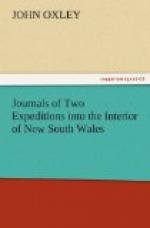The travelling was excessively bad along the sides and points of the hills; and as we had every reason to believe the country was much lower back from the river, I determined to quit its immediate banks, and endeavour to make a more direct course than we found it possible to do in following its windings, which, even if it were practicable, our provisions will not permit.
August 24.—A very thick fog arising from the river prevented us from setting forward until nearly ten o’clock, till when we could not see fifty yards in any direction. Taking the earliest opportunity to quit the river, we passed through a mountainous tract of country extremely irregular and stony, but full of springs of water, and good grass. We found it impossible to accomplish more than eight or nine miles, the tops of the hills standing quite detached and unconnected into regular ranges. We seemed ascending the ranges, which in some measure separate the country farther westward from the river; as it was much lower in a direction from south-south-west to north-west, and appeared to be fine open grazing land. At four o’clock, we halted in a small valley for the evening. Our course made good on a variety of bearings was 8. 6. W., seven miles.
August 25.—We again set forward, hoping soon to clear these lofty hills, among which we seemed to be entangled: four or five miles, on various courses, through a very rugged, but grassy country, freed us from the dividing range, as we found by the streams all running westerly, and apparently joining the river in Wellington Vale. Just before we descended what we considered the principal range, we saw Mount Lachlan bearing south from this point; and we were enabled for the remainder of the day to make a direct course towards Bathurst, through a good open grazing country of gentle hills and dales, abounding in beautiful rivulets, having their rise in the mountains east of us, which bending round to the west and north-west, and watering the finest districts in their course, contribute their waters to the Macquarie.
The country now passed over was generally good, and although the hills were stony, yet the soil upon them was equal to the flats or valleys, and covered with grass. We saw no good timber, it consisting chiefly of small box trees, thinly scattered over the sides and tops of the hills. There was plenty of kangaroos and our valuable dogs killed two fine ones.
Coarse gravel and small slate were the most common stones, but the bottoms of the rivulets were composed of a species of black jade. Quartz was very frequent.
Few traces of natives have been observed, either on the river, or since we quitted it. The population of this country must be extremely small: as the natives derive their chief support from opossums, squirrels, and rats, which are known to frequent barren scrubs and hollow trees, such neighbourhoods are unquestionably frequented by them in preference to the open country and river banks. It must be a mere accident that enables the natives to kill either a kangaroo or emu: as to fish, they certainly are ignorant of the manner of taking them by hook and line.




